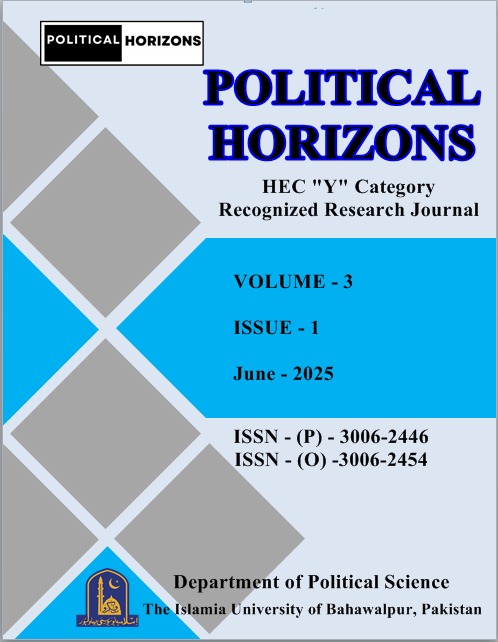Integrating Critical Discourse Analysis and Genderlect: A Framework for Reshaping Democratic Institutions Towards Gender Equity in Pakistan
Abstract
This study explores the intersection of language, gender, and democratic leadership using Norman Fairclough's CDA Model and Deborah Tannen's Genderlect Theory, in this regard, the study seeks to inquire as to how gendered discursive patterns build power relationships and thereby influence decision making within a democratic system. It proposes a bicameral system of governance where two gendered parliamentary forums, male and female, would synergistically tackle gender-specific issues and constitute an inclusive government. Organizations led by women are said to be women-centered, while those headed by men are male-centered. The model under consideration is based on cross-gender cooperation, mutual inclusion of both houses, and equality. The model stemming from the Islamic participatory spirit reiterates gender equality perceived in cultural and religious light. To this end, the present study proposes constitutional amendments to grant legitimacy for the establishment of women's and men's parliaments within institutional reforms. The issues somehow call for reforms due to recent happenings involving gender, particularly issues like the issue of the terrible rape of a girl in Punjab College and judicial pronouncement of the Lahore High Court barring male staff going to work in women-only institutions. The gravity with which the incidents demand looking into structural and legal means to protect women as well as give them visibility in governance. Drawing upon campaign trails, policy briefs, parliamentary debates, media narratives, and interviews with students, this study carried out discourse and thematic analyses as lenses to analyze the patterns of leadership and gendered social communication in action. Finding results thus lead to a democratic governance agenda in Pakistan where gender-inclusive policy-making facilitates social cohesion, equity, and progressive change.
Keywords: Gendered Leadership, Critical Discourse Analysis, Genderlect Theory, Islamic Ideology, Democracy.

Downloads
Published
How to Cite
Issue
Section
License
Copyright (c) 2025 Waqar Khan

This work is licensed under a Creative Commons Attribution-NonCommercial 4.0 International License.




